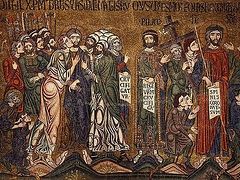In the passage of the Gospel of John that tells of the Last Supper, Christ said to Judas the words to which the evangelist himself testified, that no man at the table knew for what intent He spake this unto him (Jn. 13:28); namely: That thou doest, do quickly (Jn. 13:27). Although almost 2,000 years have passed since that symbolic Gospel event took place, many modern Christians will agree that this phrase still remains unclear to us, at least psychologically.
In our days, there are quite a few people who on the basis of this short phrase from the Savior conclude that “Judas Iscariot was not the betrayer of Jesus Christ but a mere initiated fulfiller of the prophecy”, “Judas only carried out his mission, his role in the course of events”, and so forth.
But if we want to stay within Orthodox teaching, we can’t agree with an interpretation where it is all explained as a grandiose “theatrical performance”, where each “actor” was given his “role”, and each contributed to the salvation of mankind by “playing their role”.
This is what St. John Chrysostom said, countering such opinions:
“But some one will say, Yet if it was written that He was to suffer these things, wherefore is Judas blamed, for he did the things that were written? But not with this intent, but from wickedness. For if you inquire not concerning the motive, you will deliver even the devil from the charges against him. But these things are not, they are not so. For both the one and the other are deserving of countless punishments, although the world was saved. For neither did the treason of Judas work out salvation for us, but the wisdom of Christ, and the good contrivance of His fair skill, using the wickednesses of others for our advantage. What then, one may say, though Judas had not betrayed Him, would not another have betrayed Him? And what has this to do with the question? Because if Christ must needs be crucified, it must be by the means of some one, and if by some one, surely by such a person as this. But if all had been good, the dispensation in our behalf had been impeded. Not so. For the All-Wise knows how He shall bring about our benefits, even had this happened. For His wisdom is rich in contrivance, and incomprehensible. So for this reason, that no one might suppose that Judas had become a minister of the dispensation, He declares the wretchedness of the man1.”
The same Church Father explained the meaning of the words, That thou doest, do quickly, in the following way:
“The do quickly, is not the expression of one commanding, nor advising, but of one reproaching, and showing him [the betrayer.—Auth.] that He desired to correct him, but that since he was incorrigible, He let him go.”2
That is, the words of Christ addressed to Judas at the Last Supper were yet another call for repentance. The Savior revealed to His unfaithful disciple that his scheme was known to the Teacher. The Holy Fathers and Church exegetists who paid special attention to this phrase interpreted it in accord with St. John Chrysostom.
Expressing our full solidarity with the Patristic commentary, let us continue and somewhat extend it. Thus, the disciples asked the Savior about the traitor:
Lord, who is it? Jesus answered, He it is, to whom I shall give a sop, when I have dipped it. And when He had dipped the sop, He gave it to Judas Iscariot, the son of Simon. And after the sop satan entered into him. Then said Jesus unto him, That thou doest, do quickly (Jn. 13:25-27).
All the commentators consider the words of Christ as addressed to Judas. And, unarguably, it is so. However, the Greek text (along with the Church Slavonic, Russian and other translations) of the Gospel of John also suggests that the Lord’s speech was addressed not only to Judas but also to… satan3.
This idea is based on and supported by the context of the narration. Here “satan” is not only a noun to which the pronoun “him” can be related, but also the person that entered the traitor (after Christ had given Judas a sop), enslaving his reason, senses and will completely. Now satan was using Judas as an instrument to hurt Christ (the second Adam) just as he had used the serpent to tempt Eve in the Garden of Eden. We can recall that in the story of the fall of the first-created man, Eve was tempted by the serpent; but inasmuch as that old serpent, called the devil, and satan (Rev. 12:9) acted through an animal, at the same time it was stated that Eve was tempted by satan.
It was the same with Judas: the Lord addressed Judas, but since satan had already gained full power over Judas, the Savior said this paradoxical phrase to satan himself.
Although the Holy Fathers differentiate the entry of satan into Judas from possession, they wrote:
-
“Satan entered into him—that is, he penetrated into the depth of his heart and took control of his soul”;4
-
“Satan became the absolute master of Judas and made him his servant”;5
-
“He took control of his reason and will, uniting with him in spirit.”6
For this reason we assume that Christ’s words to Judas are comparable to His dialogues with possessed people.
As was the case with the demon-possessed Gadarene man, for example:
And Jesus asked him, saying, What is thy name? And he said, Legion: because many devils were entered into him. And they besought Him that He would not command them to go out into the deep. And there was there an herd of many swine feeding on the mountain: and they besought Him that He would suffer them to enter into them. And He suffered them (Lk. 8:30-32).
Here we see that the Lord spoke simultaneously with the man and the demons by whom he was possessed—even more with the demons than with the man, because the man couldn’t control himself at all.
Thus, satan acted through Judas after the Savior had given him a morsel just as demons spoke through the possessed man, and the devil tempted Eve through the serpent in the Garden of Eden. Therefore, the Lord said to satan himself through Judas: That thou doest, do quickly (Jn. 13:27).
If we read this place attentively, we will understand this short phrase as a continuation of the dialogue between Christ and satan during the temptation in the wilderness, which the evangelist concludes with the following words: And when the devil had ended all the temptation, he departed from Him for a season (Lk. 4:13).
Undoubtedly, satan didn’t leave Christ alone throughout His ministry. He tried to affect Him through those close to Him and far from Him, through His adversaries and disciples, the Pharisees and those of His kin. However, the words for a season concern the last day of the Savior’s life on earth, the betrayal, scourging, and death. The Lord Himself testified to this: But this is your hour, and the power of darkness (Lk. 22:53), He said to those who came to seize Him in the Garden of Gethsemane.
This is precisely how St. Maximus the Confessor interpreted the words for a season:
“For what season? Till the Passion on the Cross so that by means of temptations associated with suffering he (as he hoped) could find any manifestation of human passions in the Lord.”7
And thus this time was fulfilled. Satan approached the Lord through one of His immediate disciples, entered into that disciple, and became his absolute master. But Christ knew of this terrible metamorphosis that occurred to one of the Twelve. However, Christ didn’t hide; not only did He show that all the diabolical schemes were known to Him, He also hurried him up, giving him to understand that the satanic, crafty designs were taken into account in His Divine Providence and they were powerless to shake him. It was as if the Lord said to him:
Behold, I am against thee, O Gog, the chief prince of Meshech and Tubal: And I will turn thee back, and leave but the sixth part of thee, and will cause thee to come up from the north parts, and will bring thee upon the mountains of Israel: And I will smite thy bow out of thy left hand, and will cause thine arrows to fall out of thy right hand (Ezek. 39:1-3).
The deplorable example of Judas shows us that love for material goods, which is becoming increasingly prevalent all over the world, gradually turns into a passion that opens the door to the prince of this world. As a result, man, who is called to be the temple of God (see 1 Cor. 3:16, 17), becomes the abode and instrument of satan, blocking his own way back to Christ.
Likewise, the time will come in human history when the world, which has abandoned God, will be headed by antichrist, who will come as the embodiment of a humanity that has renounced Christ and has entirely fallen under the sway of satan. Then once again the Lord will have nothing to say to this world and its prince except the words He once said to Judas and his master: That thou doest, do quickly. Do it quickly in order to hasten the Second, Final and Glorious Coming of our Lord and Savior Jesus Christ and the universal Resurrection, which is invincible before the forces of evil. And only a handful of persecuted Christians will be able to exclaim together with the apostle: Even so, come, Lord Jesus (Rev. 22:20).




